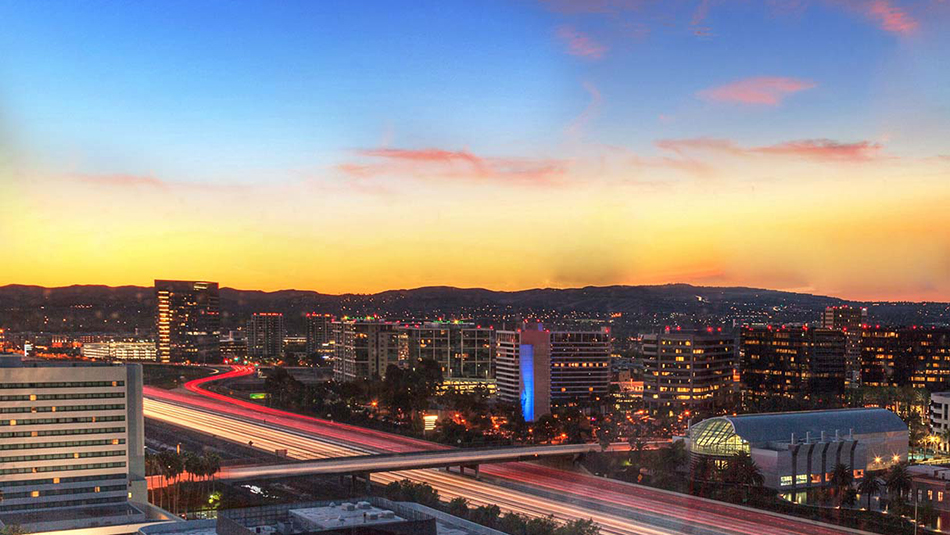
A sunset view of Irvine. Photo credit: City of Irvine
MFI report examines city’s housing, commuting and amenities
In its third of three reports on Irvine’s 50th anniversary, UCI’s Metropolitan Futures Initiative (MFI) researchers find that the city's residents have shorter commutes and more parkland than residents in the rest of Orange County.
 The report, “Irvine at 50: The changing landscape of housing, commuting, and amenities,” pays close attention to the city’s residents and their living environment (or the quality-of-life metrics). The researchers — John Hipp, MFI director and professor of criminology, law & society and urban planning and public policy; Jae Hong Kim, associate director of MFI and associate professor of urban planning and public policy; visiting scholar Sugie Lee; postdoctoral researcher Nene Osutei; and graduate students Benjamin Forthun and Donghwan Ki — explore the growth of Irvine’s boundaries and its villages and describe the types of housing in Irvine, whether detached single family units, condominiums and townhomes, or various sized apartment complexes.
The report, “Irvine at 50: The changing landscape of housing, commuting, and amenities,” pays close attention to the city’s residents and their living environment (or the quality-of-life metrics). The researchers — John Hipp, MFI director and professor of criminology, law & society and urban planning and public policy; Jae Hong Kim, associate director of MFI and associate professor of urban planning and public policy; visiting scholar Sugie Lee; postdoctoral researcher Nene Osutei; and graduate students Benjamin Forthun and Donghwan Ki — explore the growth of Irvine’s boundaries and its villages and describe the types of housing in Irvine, whether detached single family units, condominiums and townhomes, or various sized apartment complexes.
“Given these housing patterns, and the presence of so many jobs in Irvine, we explore the commuting patterns of residents in the city — both based on distance and time, as well as mode of commute — and compare them to the rest of the region,” Hipp notes. “A feature of Irvine is the presence of many parks along with the small commercial districts in the Village model that the city has followed, and, therefore, we ask whether Irvine residents indeed live closer to parks and commercial areas compared to residents in the rest of the region.”
Chapter 6 of the report describes the demographic changes that have occurred within the neighborhoods of Irvine over its history and Chapter 7 considers what the future of Irvine might look like. Some findings:
- The presumption that suburban Irvine is dominated by detached single family units is not accurate. Only 40% of the housing in the average Irvine neighborhood were detached single family units compared to 56% in the remainder of the county.
- Irvine has about twice as many very large-sized multifamily complexes (those with more than 50 units) compared to the remainder of the county.
- Irvine residents have shorter commutes than residents in the remainder of the county or region (based on time and distance).
- Residents in the remainder of Orange County have commute times about 20% longer than Irvine residents, and they are 30% longer for residents in the remainder of Southern California.
- Residents in the remainder of Orange County have commute distances about 30% longer than Irvine residents, and they are 50% to 60% longer for residents in the remainder of Southern California.
- Today, 44% of Irvine residents work at jobs in the city.
- Irvine workers are more than twice as likely to walk to work compared to the remainder of the county.
- Irvine workers are 40-70% more likely to commute by bicycles than workers in the rest of the county.
- Irvine residents have 75% more parkland within ¼ mile than do residents in the rest of the county. They have 24% more within one mile.
- Even Irvine renters do quite well on the amount of parkland nearby compared to residents in the remainder of the county.
- However, Irvine residents have about half as many retail establishments within ¼ mile compared to residents in the remainder of the county, and 2/3 as many retail jobs. They also have half as many retail establishments within one mile.
- The presence of neighborhoods with a high concentration of white residents (more than 85%) has greatly decreased over the history of the city.
- The presence of majority Asian neighborhoods has greatly increased over the history of the city.
- The presence of immigrants has grown over time, and in recent years several neighborhoods are more than 45% immigrants.
- These immigrants are primarily from China, Korea, and India, and these groups tend to reside in different neighborhoods.
- Nonetheless, a large number of Irvine neighborhoods exhibit high racial/ethnic mixing over time, especially since 2000.
Related:
Irvine has highest high-income job growth in region
Irvine sets gold standard for safety
Contact:
Mimi Ko Cruz
Director of Communications
949-824-1278